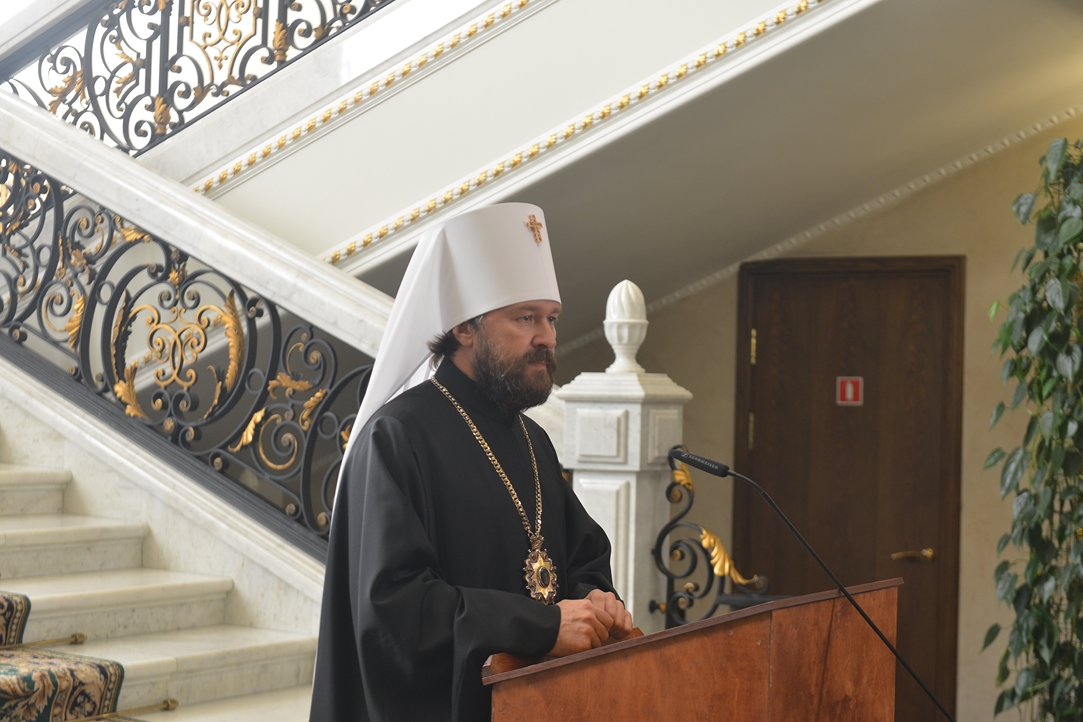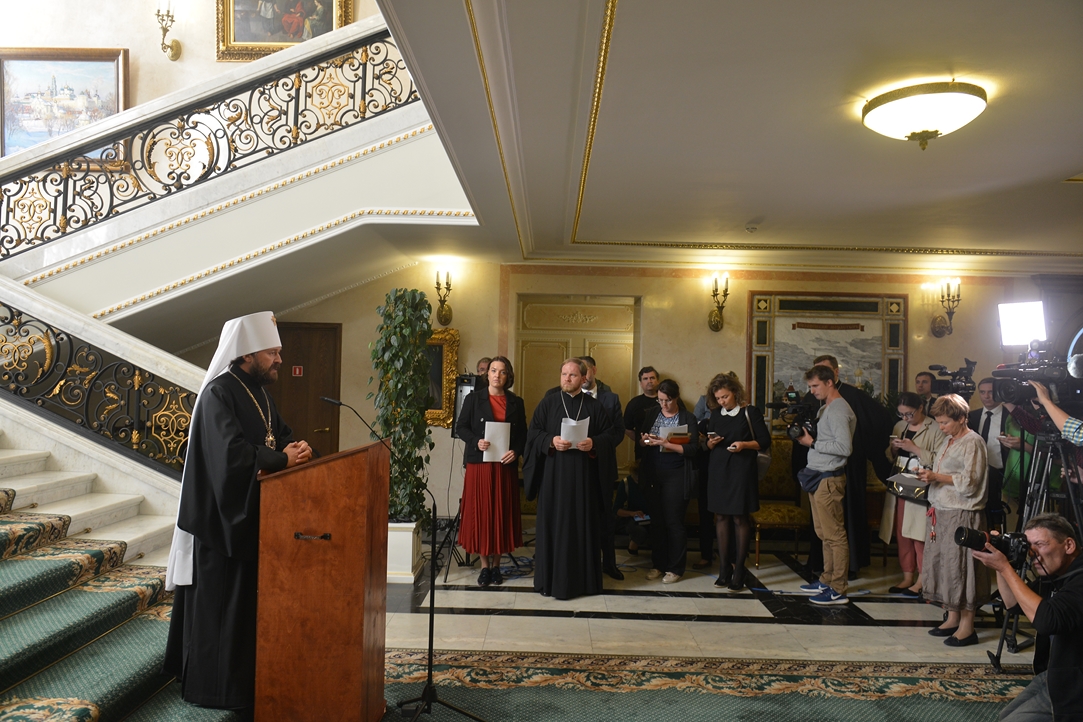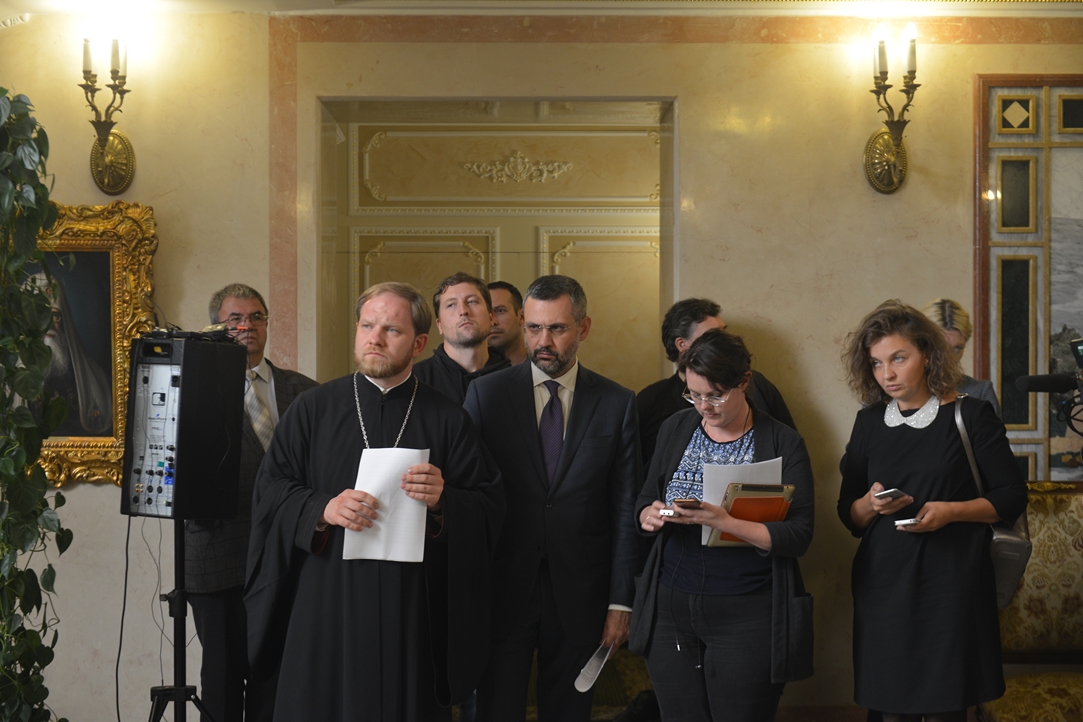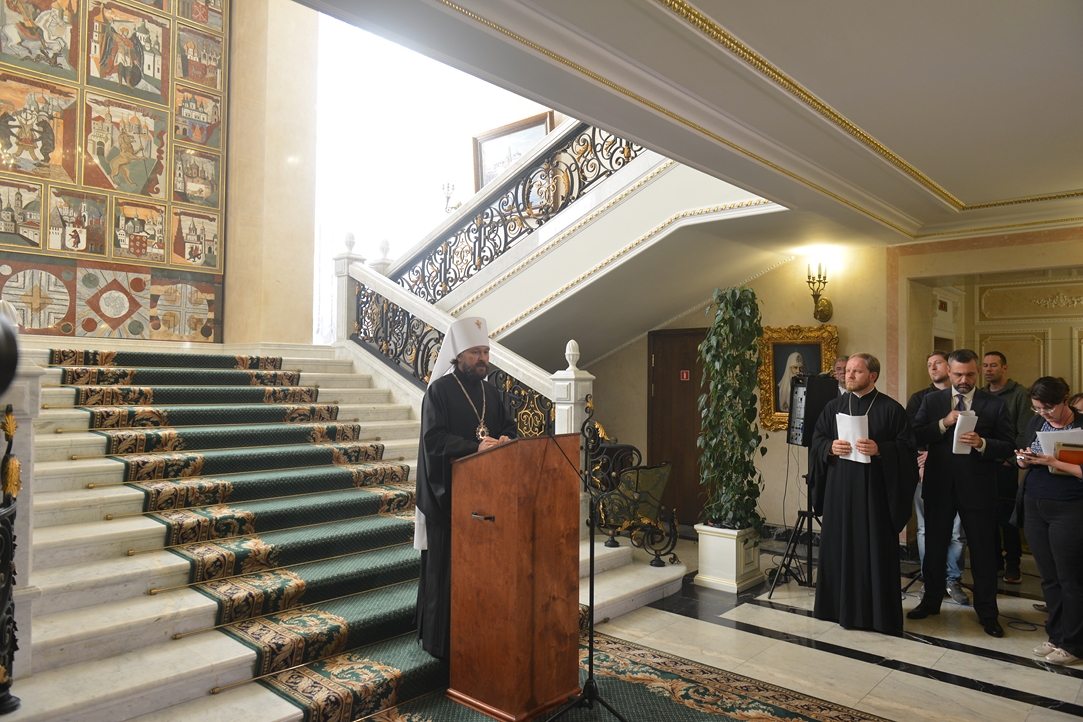Metropolitan Hilarion: The decision to suspend the liturgical mention of the Patriarch of Constantinople does not imply breaking off the Eucharistic communion







On September 12, 2018, after an urgent meeting of the Russian Orthodox Church Holy Synod to discuss the urgent situation caused by an unlawful invasion of the Patriarch of Constantinople in the canonical territory of the Russian Orthodox Church, there was s briefing for journalists.
Answers to questions from mass media reporters were given by Metropolitan Hilarion, chairman of the Moscow Patriarchate department for external church relations, who stated that the Holy Synod decided to suspend mentioning Patriarch Bartholomew of Constantinople during the liturgy in the Russian Orthodox Church. Also suspended will be the con-celebration with hierarchs of the Patriarch of Constantinople and participation in all the structures chaired or co-chaired by representatives of Constantinople. ‘The suspension includes bishop’s assemblies in the countries of the so-called diaspora and the theological dialogue’, the DECR chairman specified.
According to the metropolitan, the reasons for the Synod to make this decision is that ‘the Patriarchate of Constantinople’ unlawfully and contrary to church canons has invaded the canonical territory of the Moscow Patriarchate by appointing two exarchs of theirs to Kiev’.
The hierarch also stressed that the Patriarchate of Constantinople has justified its anti-canonical action by a peculiar historiosophy that was refuted in the statement of the Holy Synod of the Russian Orthodox Church. His Eminence said, in particular,
‘Historically, the Russian Orthodox Church has existed throughout several centuries as one metropolis with its center in Kiev. And even after metropolitans of Kiev moved first to Vladimir and later to Moscow, they continued to be called those of Kiev. The 1488 Russian Bishops’ Council elected Saint Jonah as the first head of the Russian Orthodox Church without a consent of the Patriarchate of Constantinople. It happened so not because the Russian Church wished to break off communion with Constantinople but because the Patriarch of Constantinople at that moment was in union with Rome, that is, there was no Orthodox Patriarch in Constantinople. Since that moment the Russian Orthodox Church has begun to live her autocephalous life.
Ten years later, in 1458, former Patriarch Gregory Mammas of Constantinople, who joined unia and lived in Rome, appointed to Kiev the Uniate Metropolitan Gregory the Bulgarian. Since that moment, the see of Kiev began to live an independent life outside the Russian Church, which continued for over two hundred years.
In 1686, the two parts of the Russian Orthodox Church united as the metropolis of Kiev joined the Russian Church, which now already had the status of patriarchate recognized by other Eastern patriarchs. The metropolis of Kiev joining the Moscow Patriarchate as its part was confirmed by a charter of Patriarch Dionysius IV of Constantinople. There is no statement in the charter about any temporary entry of the metropolis of Kiev as part of the Moscow Patriarchate. And for over 300 years nobody has challenged this status of the metropolis of Kiev as part of the Moscow Patriarchate.
Recently, to justify his actions in Ukraine the Patriarch of Constantinople has begun challenging this status by stating now that the Ukrainian Church, as it has turned out, has always been under the jurisdiction of the Patriarchate of Constantinople, which allegedly has a full right to grant her autocephaly unilaterally. We strongly object to this attitude, the more so that in 1993 a pan-Orthodox decision was made that any autocephaly will be henceforth granted only with approval of all the Local Orthodox Churches. And the Local Orthodox Churches have not approved the actions undertaken now by Constantinople in Ukraine’.
Metropolitan Hilarion recalled that in the early 20th century when Patriarch Tikhon and the Renovators tormenting the Church, demanded his deposition, Patriarch Gregory II of Constantinople took their side. For some ten years, the representative of the Patriarchate of Constantinople in Moscow, Archimandrite Basil (Dimopoulo), supported the Renovators and served in their churches while Patriarch Gregory II demanded that patriarchate should be abolished even for a time being.
‘We would not recall this page in the history of our relations with Constantinople if these sad events had not been repeated today’, His Eminence said, ‘Whenever the Russian Orthodox Church proves to be in a difficult situation, instead of fraternal support and solidary we received from the Patriarchate of Constantinople a stab in the back. In the 20s, the Patriarchate of Constantinople unilaterally granted autocephaly to the Polish Church, created its own structures in the territory of Finland and Estonia, although these countries were parts of the canonical jurisdiction of the Russian Orthodox Church.
Metropolitan Hilarion also underscored that the decision of the Holy Synod of the Russian Orthodox Church to suspend con-celebration with hierarchs of the Patriarchate of Constantinople and the suspension of participation in the structures chaired by Constantinople has been a compelled one.
‘We were eager to avoid it as for many years we have sought to solve problems through dialogue. Among the latest attempts of this kind was the trip of Patriarch Kirill to Istanbul where, in the course of a confidential and fraternal talk, His Holiness set forth the position of the Russian Orthodox Church and warned his Constantinopolitan Brother against the actions, which, regrettably, have been carried out. But as soon as Patriarch Kirill left Istanbul – we learnt about it later – Patriarch Bartholomew assembled the Holy Synod and, in the course of the session, it was decided to reject the proposals which had come from our Church. Then Patriarchate Bartholomew convened a Synod of the Patriarchate of Constantinople hierarchy in which reports were made about how to operate in Kiev to be followed by the appointment of the exarchs.
We reacted to the appointment of the exarchs already on September 8 and warned that some measures would follow in response in the nearest future. Today, we have assembled to discuss and formulate them. All the members of the Holy Synod of the Russian Orthodox Church participated in the discussion. His Beatitude Onufriy, Metropolitan of Kiev, who could not come for health reasons, took part in the discussion by Skype’.
After this statement, Metropolitan Hilarion answered questions from mass media reporters.
- You are speaking about the suspension of liturgical mention. It does not mean the suspension of the Eucharistic communion, does it? That is, can the faithful still take communion together?
- The decision of the Holy Synod to suspend the liturgical mention of the Patriarch of Constantinople’s name during the liturgy and the fact that we suspend con-celebration with hierarchs of the Patriarchate of Constantinople does not imply a full breaking-off of the Eucharistic communion. The lay people who come to Mount Athos or find themselves in churches of the Patriarchate of Constantinople can take communion in them. But we refuse to concelebrate with hierarchs of the Patriarchate of Constantinople since every time they mention the name of their Patriarch during the liturgy while we have suspended it.
- Is that to say that the Patriarch of Constantinople is no longer believed to be the first among equals? How does it change his place in the diptych?
- During the liturgy celebrated by His Holiness Patriarch Kirill, the mention will begin immediately with the Patriarch of Alexandria, rather than that of Constantinople, as was the case until the present.
- Tell us, please, in your opinion, why has this decision been made precisely now, and is there a hope that you will manage to change anything, to agree on something, or is it the final decision?
- I believe that the decision to send exarchs to Kiev has been taken precisely now is because Constantinople is in a great hurry to complete the process of granting autocephaly as long as the power is in the hands of the present President of Ukraine Petr Poroshenko, who is its active supporter. We do not think, of course, that all this will finally shut the door for dialogue, but our today’s decision is a signal to the Patriarchate of Constantinople that if the actions of this kind continue, we will have to break the Eucharistic communion entirely.
The Patriarch of Constantinople is posing as a sort of the leader of a 300-million-srong Orthodox population of the planet, as the mass media describe him. But after the breaking-off of the Eucharistic communion, at least a half of this 300-million-strong population will no longer recognize him as even the first among equals.
- Tell us, please, isn’t the Holy Synod afraid of a negative scenario will develop in Ukraine in connection with the announcement of possible autocephaly? In particular, the capture of the shrines of the Russian Orthodox Church, such as the Kiev Laura of the Caves, etc.?
- We cannot excluded that, for the captures of churches in Ukraine have already happened and already 50 churches of the canonical Ukrainian Orthodox Church have been seized by the schismatics. If this project for autocephaly continues, if the schism is legitimized, then we can forecast the saddest consequences for the Ukrainian Church, for these pogroms will most likely continue. The schismatics declare already now that the Kiev Laura of the Caves should be transferred to the so-called one Ukrainian local church, and they do not conceal their claims to shrines, monasteries and churches, which are now under the jurisdiction of the Ukrainian Orthodox Church.
- Your Eminence, will there be a common prayer at all for the healing of the schism in Ukraine?
- We have decided that prayers will be lifted up in all the churches of the Russian Orthodox Church for the unity of Holy Orthodoxy. And we have drafted prayer petitions, which will be published today as well.
In our statement we have also called upon Primates, heads of Local Orthodox Churches to initiate a pan-Orthodox discussion on the church situation in Ukraine. It is our profound conviction that if this problem is to be solved not unilaterally by the Patriarchate of Constantinople but in a fraternal discussion of Local Orthodox Churches, a solution will be found that will calm down everybody and reconcile everybody and help heal the schism.
DECR Communication Service
